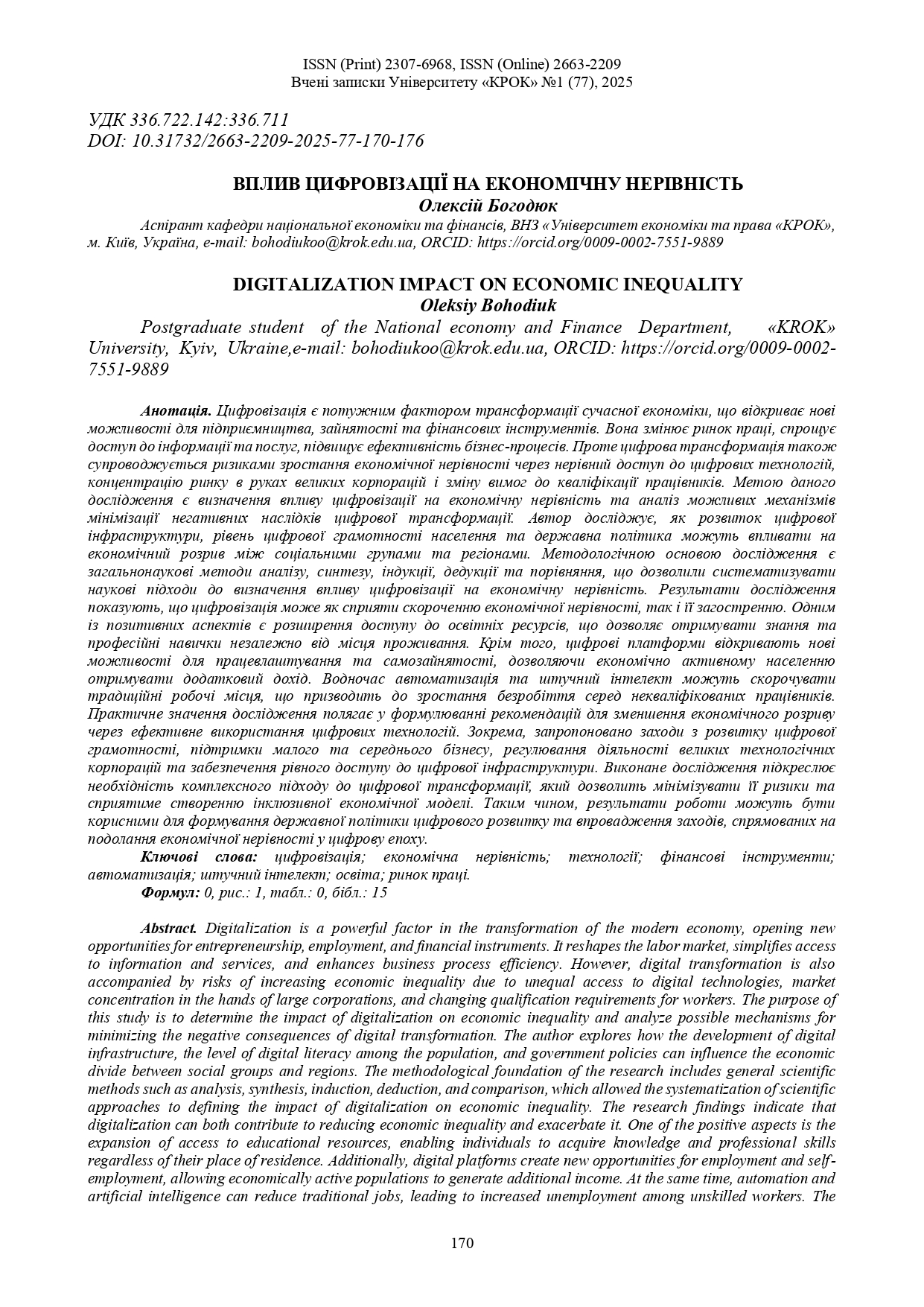DIGITALIZATION IMPACT ON ECONOMIC INEQUALITY
DOI:
https://doi.org/10.31732/2663-2209-2025-77-170-176Keywords:
digitalization, economic inequality, technologies, financial instruments, automation, artificial intelligence, education, labor marketAbstract
Digitalization is a powerful factor in the transformation of the modern economy, opening new opportunities for entrepreneurship, employment, and financial instruments. It reshapes the labor market, simplifies access to information and services, and enhances business process efficiency. However, digital transformation is also accompanied by risks of increasing economic inequality due to unequal access to digital technologies, market concentration in the hands of large corporations, and changing qualification requirements for workers. The purpose of this study is to determine the impact of digitalization on economic inequality and analyze possible mechanisms for minimizing the negative consequences of digital transformation. The author explores how the development of digital infrastructure, the level of digital literacy among the population, and government policies can influence the economic divide between social groups and regions. The methodological foundation of the research includes general scientific methods such as analysis, synthesis, induction, deduction, and comparison, which allowed the systematization of scientific approaches to defining the impact of digitalization on economic inequality. The research findings indicate that digitalization can both contribute to reducing economic inequality and exacerbate it. One of the positive aspects is the expansion of access to educational resources, enabling individuals to acquire knowledge and professional skills regardless of their place of residence. Additionally, digital platforms create new opportunities for employment and self-employment, allowing economically active populations to generate additional income. At the same time, automation and artificial intelligence can reduce traditional jobs, leading to increased unemployment among unskilled workers.The practical significance of the study lies in formulating recommendations for reducing the economic gap through the effective use of digital technologies. In particular, measures are proposed to develop digital literacy, support small and medium-sized enterprises, regulate the activities of large technology corporations, and ensure equal access to digital infrastructure. The study highlights the need for a comprehensive approach to digital transformation that minimizes its risks and promotes the creation of an inclusive economic model. Thus, the results of this work may be useful in shaping government digital development policies and implementing measures aimed at overcoming economic inequality in the digital era.
Downloads
References
Alexander Edlich, Christopher Croke, Fredrik Dahlqvist, Warren Teichner (2025). Global Private Markets Report 2025: Private equity emerging from the fog. Доступ через: https://www.mckinsey.com/industries/private-capital/our-insights/global-private-markets-report
Devlin Peck (2025). Online Learning Statistics: The Ultimate List in 2025. Доступ через: https://www.devlinpeck.com/content/online-learning-statistics
E. Hazan, A. Madga (2024). A new future of work: The race to deploy AI and raise skills in Europe and beyond. Доступ через: https://www.mckinsey.com/mgi/our-research/a-new-future-of-work-the-race-to-deploy-ai-and-raise-skills-in-europe-and-beyond
Facts about poverty in America (2024). Доступ через: https://www.feedingamerica.org/hunger-in-america/poverty?utm_source=chatgpt.com
Maryann P. Feldman (2021). Big Tech, Bigger Regional Inequality. Доступ через: https://kenaninstitute.unc.edu/kenan-insight/big-tech-bigger-regional-inequality/
Маркевич К. (2021). Цифровізація: переваги та шляхи подолання викликів. Доступ через: https://razumkov.org.ua/statti/tsyfrovizatsiia-perevagy-ta-shliakhy-podolannia-vyklykiv
Мінцифри України (2024). Кількість користувачів «Дії» вже перевищила 20,5 млн на червень 2024 року. Доступ через: https://www.ukrinform.ua/rubric-society/3880141-kilkist-koristuvaciv-dii-vze-perevisila-205-miljona.html
Pelin Özgul (2024). High-skilled Human Workers in Non-Routine Jobs are Susceptible to AI Automation but Wage Benefits Differ between Occupations. Доступ через: https://arxiv.org/pdf/2404.06472
Robert F. Smith (2025). Digital and wealth gaps have no place in the Intelligent Age. Here's how everyone can benefit from AI. Доступ через: https://www.weforum.org/stories/2025/01/digital-divide-intelligent-age-how-everyone-can-benefit-ai/
Steve Morgan (2025). Cybercrime To Cost The World $10.5 Trillion Annually By 2025. Доступ через: https://cybersecurityventures.com/hackerpocalypse-cybercrime-report-2016/
Соснін О. (2020). Цифровізація як нова реальність України. Доступ через: https://lexinform.com.ua/dumka-eksperta/tsyfrovizatsiya-yak-nova-realnist-ukrayiny/
Van Deursen, A. J. A. M., & Helsper, E. J. (2015). A nuanced understanding of Internet use and non-use amongst the elderly. European Journal of Communication, 30(2), 171-187.
Вознюк О.В. (2023). Негативні та позитивні наслідки цифровізації освітнього процесу. Доступ через: http://eprints.zu.edu.ua/36321/1/%D0%92%D0%BE%D0%B7%D0%BD%D1%8E%D0%BA%20%D0%A2%D0%B5%D0%B7%D0%B8%202023.pdf
Еволюція IT-аутсорсингу в Україні (2017). Доступ через: https://eba.com.ua/evolyutsiya-autsorsyngu-v-ukrayini/
Number of Coursera learners. Доступ через: https://elearningstats.education/

Downloads
Published
How to Cite
Issue
Section
License

This work is licensed under a Creative Commons Attribution-NonCommercial 4.0 International License.

